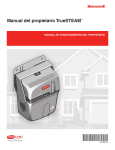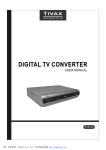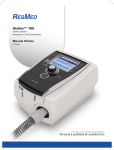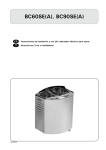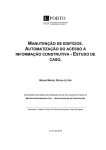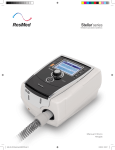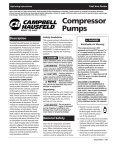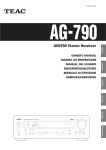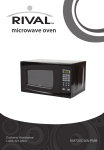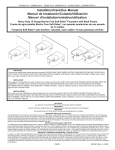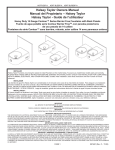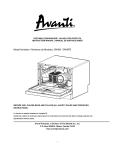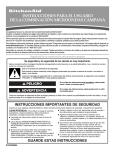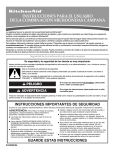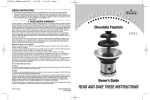Download continuado
Transcript
TABLE OF CONTENTS IMPORTANT SAFETY INSTRUCTIONS PRECAUTIONS TO AVOID POSSIBLE EXPOSURE TO EXCESSIVE MICROWAVE ENERGY INSTALLATION GUIDE GROUNDING INSTRUCTIONS PRODUCT DIAGRAM CONTROL PANEL INSTALLING THE TURNTABLE OPERATION INSTRUCTIONS UTENSILS GUIDE COOKING TECHNIQUES CLEANING AND CARE BEFORE CALLING FOR SERVICE SPECIFICATIONS WARRANTY 1 2 4 4 5 6 7 8 8 12 13 14 15 15 16 IMPORTANT SAFETY INSTRUCTIONS When using electrical appliances, basic safety precautions should be followed, including the following: WARNING- To reduce the risk of burns, electric shock, fire, injury to persons or exposure to excessive microwave energy: 1. Read all instructions before using the appliance. 2. Read and follow the specific "PRECAUTIONS TO AVOID POSSIBLE EXPOSURE TO EXCESSIVE MICROWAVE ENERGY" on page 4. 3. This appliance must be grounded. Connect only to properly grounded outlet. See "GROUNDING INSTRUCTIONS" on page 5. 4. Install or locate this appliance only in accordance with the provided installation instructions. 5. Some products such as whole eggs and sealed containers -for example, closed glass jars- are able to explode and should not be heated in this oven. 6. Use this appliance only for its intended use as described in this manual. Do not use corrosive chemicals or vapors in this appliance. This type of oven is specifically designed to heat, cook, or dry food. It is not designed for industrial or laboratory use. 7. As with any appliance, close supervision is necessary when used by children. 8. To reduce the risk of fire in the oven cavity: 1) Do not overcook food. Carefully attend appliance when paper, plastic, or other combustible materials are placed inside the oven to facilitate cooking. 2) Remove wire twist-ties from paper or plastic bags before placing bag in oven. 3) If materials inside the oven should ignite, keep oven door closed, turn oven off, and disconnect the power cord or shut off power at the fuse or circuit breaker panel. 4) Do not use the cavity for storage purposes. Do not leave paper products, cooking utensils or food in the cavity when not in use. 9. Liquids, such as water, coffee, or tea are able to be overheated beyond the boiling point without appearing to be boiling due to surface tension of the liquid. Visible bubbling or boiling when the container is removed from the microwave oven is not always present. THIS COULD RESULT IN VERY HOT LIQUIDS SUDDENLY BOILING OVER WHEN A SPOON OR OTHER UTENSIL IS INSERTED INTO THE LIQUID. To reduce the risk of injury to person: 1) Do not overheat the liquid. 2) Stir the liquid both before and halfway through heating it. 3) Do not use straight-sided containers with narrow necks. 4) After heating, allow the container to stand in the microwave oven for a short time before removing the container. 5) Use extreme care when inserting a spoon or other utensil into the container. 10. Do not heat oil or fat for deep-frying. It is difficult to control the temperature of oil in microwave oven. 11. Pierce foods with heavy skins such as potatoes, whole squash, apples and chestnuts before cooking. 12. The contents of feeding bottles and baby jars should be stirred or shaken and the temperature should be checked before serving in order to avoid burns. 2 IMPORTANT SAFETY INSTRUCTIONS (continued) 13. Cooking utensils may become hot because of heat transferred from the heated food. Potholders may be needed to handle the utensil. 14. Do not cover or block any openings on the appliance. 15. Do not store or use this appliance outdoors. Do not use this product near water, for example, near a kitchen sink, in a wet basement, near a swimming pool, or similar locations. 16. Do not operate this appliance if it has a damaged cord or a plug, if it is not working properly or if it has been damaged or dropped. 17. Do not immerse cord or plug in water. Keep cord away from heated surface. Do not let cord hang over edge of table or counter. 18. Use only thermometers, which are specifically designed for use in microwave ovens. 19. Do not operate any heating or cooking appliance beneath this appliance. 20. Be certain the glass tray and roller rings are in place when you operate the oven. 21. This appliance should be serviced only by qualified service personnel, contact nearest authorized service facility for examination, repair, or adjustment. 22. When cleaning surfaces of door and oven that comes together on closing the door, use only mild, nonabrasive soaps, or detergents applied with a sponge or soft cloth. SAVE THESE INSTRUCTIONS 3 PRECAUTIONS TO AVOID POSSIBLE EXPOSURE TO EXCESSIVE MICROWAVE ENERGY 1. 2. 3. 4. Do not attempt to operate this oven with the door-open since open-door operation can result in harmful exposure to microwave energy. It is important not to defeat or tamper with the safety interlocks. Do not place any object between the oven front face and the door or allow soil or cleaner residue to accumulate on sealing surfaces. Do not operate the oven if it is damaged. It is particularly important that the oven door close properly and that there is no damage to the: 1) Door (bent), 2) Hinges and latches (broken or loosened), 3) Door seals and sealing surfaces. The oven should not be adjusted or repaired by anyone except properly qualified service personnel. INSTALLATION GUIDE 1. 2. 3. 4. 5. 6. 7. 8. Make sure that all the packing materials are removed from the inside of the door. Check the oven for any damage, such as misaligned or bent door, damaged door seals and sealing surface, broken or loose door hinges and latches and dents inside the cavity or on the door. If there is any damage, do not operate the oven but contact qualified service personnel. This microwave oven must be placed on a flat, stable surface to hold its weight and the heaviest food likely to be cooked in the oven. Do not place the oven where heat, moisture, or high humidity are generated, or near combustible materials. For correct operation, the oven must have sufficient airflow. Allow 20cm of space above the oven, 10cm at back and 5cm at both sides. Do not cover or block any openings on the appliance. Do not remove feet on which oven stands. Do not operate the oven without glass tray, roller support, and shaft in their proper positions. Make sure that the power supply cord is undamaged and does not run under the oven or over any hot or sharp surface. The socket must be readily accessible so that it can be easily unplugged in an emergency. 4 GROUNDING INSTRUCTIONS This appliance must be grounded. In the event of an electrical short circuit, grounding reduces risk of electric shock by providing an escape wire for the electric current. WARNING: Improper use of the grounding plug can result in a risk of electric shock. Consult a qualified electrician or serviceman if the grounding instructions are not completely understood, or if doubt exists as to whether the appliance is properly grounded, and either: 1) If it is necessary to use an extension cord, use only a 3-wire extension cord that has a 3-blade grounding plug and a 3-slot receptacle that will accept the plug on the appliance. The marked rating of the extension cord shall be equal to or greater than the electrical rating of the appliance, or 2) Do not use an extension cord. If the power supply cord is too short, have a qualified electrician or serviceman install an outlet near the appliance. ELECTRICAL REQUIREMENTS The electrical requirements are a 120 volt 60 Hz, AC only, 15 amp. It is recommended that a separate circuit serving only the oven be provided. The oven is equipped with a 3-prong grounding plug. It must be plugged into a wall receptacle that is properly installed and grounded. POWER SUPPLY CORD A short power supply cord is provided to reduce the risks resulting from becoming entangled in or tripping over a longer cord. Longer cord sets or extension cords are available and may be used if care is exercised in their use. If long cord or extension cord is used: a) The marked electrical rating of the cord set or extension cord should be at least as great as the electrical rating of the appliance. b) The extension cord must be a grounding-type 3-wire cord, and the longer cord should be arranged so that it will not drape over the counter top or table top where it can be pulled on by children or tripped over unintentionally. NOTE: · If you have any questions about the grounding or electrical instructions, consult a qualified electrician or service person. RADIO OR TV INTERFERENCE Should there be any interference caused by the microwave oven to your radio or TV, check that the microwave oven is on a different circuit, relocated the radio or TV as far away from the oven as feasible or check position and signal of receiving antenna. 5 PRODUCT DIAGRAM 1. 2. 3. 4. 5. 6. 7. Door Lock System Oven Window Roller Ring Door Release Button Control Panel Spatter Shield (Do not remove) Glass Tray 6 CONTROL PANEL MENU ACTION SCREEN Cooking time, power, indicators and present time are displayed. TIME COOK Press to set cooking time. TIME DEFROST Quick defrost function that alternates defrost and stand times to quickly and effectively defrost foods. WEIGHT DEFROST Programmed defrosting based on the weight of the foods to be defrosted. POWER Press to set power levels. CLOCK Press to set current time. KETCHEN TIMER Press to set timer function. MENU PADS There are six kinds of cook menus. Press to set auto cook function. EXPRESS COOK (1-6) There are six kinds of cooking time (from one minute to six minutes) for high power level. Press to set express cook function. NUMBER PADS (0-9) Press to enter time, the weight of defrosted food or power level. STOP/CANCEL Press to pause or cancel a cooking program.It is also used to set child lock function. MEMORY (0) Press to set memory function for the oven. START/+30 SEC Press to start a cooking program. It is also used to set quick start function or to increase cooking time during cooking. 7 INSTALLING THE TURNTABLE Never place the glass tray upside down. The glass tray should never be restricted. Both the glass tray and turntable ring assembly must always be used during cooking. All food and containers of food should always be placed on the glass tray for cooking. If the glass tray or turntable ring assembly cracks or breaks, contact your nearest authorized service center. OPERATION INSTRUCTIONS If you want to pause a cooking program, please press STOP/CANCEL pad once, then press START/+30 SEC. pad to restart the cooking program, but if you pressSTOP/CANCEL pad twice, the cooking program will be canceled. SETTING THE CLOCK 1. In standby mode, press CLOCK pad. Use the number pads to enter the correct time. 3. Press CLOCK pad again. NOTE: This is a 12 hour clock. When the oven is first plugged in or when power resumes after a power interruption, the display will show 0:00. During cooking, you can press CLOCK pad to check the present time. 2. SETTING THE OVEN TIMER In standby mode, pressKITCHEN TIMER pad. 2. Enter the amount of time by pressing the number pads. 3. Press START/+30 SEC. pad to start the program. NOTE: The longest time you can set is 99 minutes and 99 seconds. You can cancel the function by pressing STOP/CANCEL pad. 1. SETTING A COOKING PROGRAM A. One-stage Cooking 1. 2. 3. 4. 5. 6. Place food into oven and close the door. Press TIME COOK pad. Use the number pads to set cooking time. Press POWER pad. Use the number pads to enter power level. Press START/+30 SEC. pad to start the program. 8 OPERATION INSTRUCTIONS (continued) Use single digit to set a cooking power level: Number pad Power Level 1,0 PL10 (100%) 9 PL9 (90%) 8 PL8 (80%) 7 PL7 (70%) 6 PL6 (60%) 5 PL5 (50%) Number pad 4 3 2 1 0 Power Level PL4 (40%) PL3 (30%) PL2 (20%) PL1 (10%) PL0 (0%) NOTE: · During cooking, you can press POWER pad to check the cooking power. · During cooking, you can press START/+30 SEC. pad continually to increase the cooking time. The longest cooking time you can set is 99 minutes and 99 seconds. B. Two-stage Cooking Some recipes require different stages of cooking at different temperatures. 1. SET STAGE 1: Follow steps from 1 to5 in “One-stage Cooking”. 2. SET STAGE 2: Follow steps from 1 to5 in “One-stage Cooking”. (Most 2-stage recipes use lower power for second stage.) 3. Press START/+30 SEC. pad to start the program. NOTE: · Following steps from 1 to 3 in Time Defrost program or Weight Defrost program also can be set in two-stage cooking for any stage. TIME DEFROST Place food into oven and close the door. Press TIME DEFROST pad. 3. Enter desired defrosting time by pressing correct number pads. 4. Press START/+30 SEC. pad to start the program. NOTE: · During cooking, you can press START/+30 SEC. pad continually to increase the defrosting time. The longest defrosting time you can set is 99 minutes and 99 seconds. · During cooking, maybe you need to pause the program to turn food over, then close the door and press START/+30 SEC. pad to resume. 1. 2. 9 OPERATION INSTRUCTIONS (continued) WEIGHT DEFROST Place food into oven and close the door. 2. Press WEIGHT DEFROST pad. 3. Enter the weight of food by pressing number pads. 4. Press START/+30 SEC. pad to start the program. NOTE: · The weight of food you can set is between 4 oz and 100 oz. · During cooking, maybe you need to pause the program to turn food over, then close the door and press START/+30 SEC. pad to resume. 1. EXPRESS COOK This function can help you to set a microwave cooking program quickly without setting the power level. Place food into oven and close the door, then press any EXPRESS COOK pad (1-6), the oven will start the program automatically at full power level. During cooking, you can press START/+30 SEC. pad continually to increase the cooking time. The longest cooking time you can setis 99 minutes and 99 seconds. QUICK START This function can help you to set a microwave cooking program quickly without setting the power level. Place food into oven and close the door, then press START/+30 SEC. pad continually to set cooking time, the oven will start the program automatically at full power level. During cooking, you can press START/+30 SEC. pad continually to increase the cooking time. The longest cooking time you can set is 99 minutes and 99 seconds. MEMORY FUNCTION This function can help you to start the stored cooking programs directly. The system can store three cooking programs. A. Store the first cooking program 1. In standby mode, Press MEMORY (0) pad once. 2. Set a one-stage cooking or two-stage cooking program. 3. Press START/+30 SEC. pad to confirm the program. B. Store the second cooking program 1. In standby mode, Press MEMORY (0) pad twice. 2. Set a one-stage cooking or two-stage cooking program. 3. Press START/+30 SEC. pad to confirm the program. 10 OPERATION INSTRUCTIONS (continued) C. Store the third cooking program 1. In standby mode, Press MEMORY (0) pad thrice. 2. Set a one-stage cooking or two-stage cooking program. 3. Press START/+30 SEC. pad to confirm the program. To start the stored cooking program: Place food into oven and close the door, press MEMORY (0) pad once, twice or thrice to select the stored cooking program, and then press START/+30 SEC. pad to start the stored cooking program. NOTE: · When the oven is plugged in or when power resumes after a power interruption, the memory function is canceled, you need to reset the function before using. SETTING CHILD LOCK The lock prevents unsupervised operation by children. To set the child lock:In standby mode, press and hold STOP/CANCEL pad for 3 seconds, then a beep will sound. In the lock state, all buttons are disabled. To cancel the child lock: Press and hold STOP/CANCEL pad for 3 seconds, then a beep will sound. AUTO COOK For food or the following cooking mode, it is not necessary to program the time and the cooking power. It is sufficient to indicate the type of food that you want to cook as well as the weight or serving of this food. 1. Place food into oven and close the door. 2. Press any your need menu pad from six kinds of cook menus continually to enter the weight or serving of food. 3. Press START/+30 SEC. pad to start the program. NOTE: · When you press POTATO and BEVERAGE menu pads, the screen shows the serving of food. Each cup of beverage is 4 oz. Each serving of potato is 8 oz. 11 UTENSILS GUIDE This section lists which utensils can be used in the microwave, which ones have limited use for short periods, and which ones should not be used in the microwave. RECOMMENDED Microwave browning dish — Use to brown the exterior of small items such as steaks, chops, or pancakes. Follow the directions provided with your browning dish. Microwaveable plastic wrap — Use to retain steam. Leave a small opening for some steam to escape and avoid placing it directly on the food. Paper towels and napkins — Use for short-term heating and covering; these absorb excess moisture and prevent spattering. Do not use recycled paper towels, which may contain metal and could ignite. Glass and glass-ceramic bowls and dishes — Use for heating or cooking. Paper plates and cups — Use for short-term heating at low temperatures. Do not use recycled paper, which may contain metal and could ignite. Wax paper — Use as a cover to prevent spattering. Thermometers — Use only those labeled "Microwave Safe" and follow all directions. Check the food in several places. Conventional thermometers may be used on microwave food once the food has been removed from the oven. LIMITED USE Aluminum foil — Use narrow strips of foil to prevent overcooking of exposed areas. Using too much foil can damage your oven, so be careful. You should keep distance of 1 inch (2.54cm) between aluminum foil and cavity. Ceramic, porcelain, and stoneware — Use these if they are labeled "Microwave Safe". If they are not labeled, test them to make sure they can be used safely. Plastic — Use only if labeled "Microwave Safe". Other plastics can melt. NOT RECOMMENDED Glass jars and bottles — Regular glass is too thin to be used in a microwave. It can shatter and cause damage and injury. Paper bags — These are a fire hazard, except for popcorn bags that are designed for microwave use. Styrofoam plates and cups — These can melt and leave an unhealthy residue on food. Plastic storage and food containers — Containers such as margarine tubs can melt in the microwave. Metal utensils — These can damage your oven. Remove all metal before cooking. Note: · Should you wish to check if a dish is safe for microwaving, place the empty dish in the oven and microwave on HIGH for 30 seconds. A dish which becomes very hot should not be used. 12 COOKING TECHNIQUES Your microwave makes cooking easier than conventional cooking, provided you keep these considerations in mind: STIRRING Stir foods such as casseroles and vegetables while cooking to distribute heat evenly. Food at the outside of the dish absorbs more energy and heats more quickly, so stir from the outside to the center. The oven will turn off when you open the door to stir your food. ARRANGEMENT Arrange unevenly shaped foods, such as chicken pieces or chops, with the thicker, meatier parts toward the outside of the turntable where they receive more microwave energy. To prevent overcooking, place delicate areas, such as asparagus tips, toward the center of the turntable. SHIELDING Shield food with narrow strips of aluminum foil to prevent overcooking. Areas that need shielding include poultry wing tips, the ends of poultry legs, and corners of square baking dishes. Use only small amounts of aluminum foil. Larger amounts can damage your oven. TURNING Turn foods over midway through cooking to expose all parts to microwave energy. This is especially important with large foods such as roasts. STANDING Foods cooked in the microwave build up internal heat and continue to cook for a few minutes after heating stops. Let foods stand to complete cooking, especially foods such as cakes and whole vegetables. Roasts need this time to complete cooking in the center without overcooking the outer areas. All liquids, such as soup or hot chocolate, should be shaken or stirred when cooking is complete. Let liquids stand a moment before serving. When heating baby food, stir well at removal and test the temperature before serving. 13 COOKING TECHNIQUES (continued) ADDING MOISTURE Microwave energy is attracted to water molecules. Food that is uneven in moisture content should be covered or allowed to stand so that the heat disperses evenly. Add a small amount of water to dry food to help it cook. CLEANING AND CARE Turn off the oven and remove the power plug from the wall socket before cleaning. 2. Keep the inside of the oven clean. When food splatters or spilled liquids adhere to oven walls, wipe with a damp cloth. Mild detergent may be used if the oven gets very dirty. Avoid the use of spray and other harsh cleaners as they may stain, streak or dull the door surface. 3. The outside surfaces should be cleaned with a damp cloth. To prevent damage to the operating parts inside the oven, water should not be allowed to seep into the ventilation openings. 4. Wipe the window on both sides with a damp cloth to remove any spills or spatters. 5. Do not allow the control panel to become wet. Clean with a soft, damp cloth. When cleaning the control panel, leave oven door open to prevent oven from accidentally turning on. 6. If steam accumulates inside or around the outside of the oven door, wipe with a soft cloth. This may occur when the microwave oven is operated under high humidity conditions. In such case, it is normal. 7. It is occasionally necessary to remove the glass tray for cleaning. Wash the tray in warm sudsy water or in a dishwasher. 8. The roller ring and oven floor should be cleaned regularly to avoid excessive noise. Simply wipe the bottom surface of the oven with mild detergent. The roller ring may be washed in mild sudsy water or dishwasher. When removing the roller ring from cavity floor for cleaning, be sure to replace in the proper position. 9. Remove odors from your oven by combining a cup of water with the juice and skin of one lemon in a deep microwaveable bowl, microwave for 5 minutes. Wipe thoroughly and dry with a soft cloth. 10. When it becomes necessary to replace the oven light, please contact customer service (1-866-321-9509) to have it replaced. 11. The oven should be cleaned regularly and any food deposits removed. Failure to maintain the oven in a clean condition could lead to deterioration of the surface that could adversely affect the life of the appliance and possibly result in a hazardous situation. 12. Please do not dispose this appliance into the domestic rubbish bin, it should be disposed to the particular disposal center provided by the municipalities. 1. 14 BEFORE CALLING FOR SERVICE Before asking for service, please check each item below: Check to ensure the microwave is plugged in securely. If not, remove the plug from the outlet, wait 10 seconds, and plug it in again securely. Check for a blown circuit fuse or a tripped main circuit breaker. If there seem to be operating properly, test the outlet with another appliance. Check to ensure the control panel is programmed correctly and the timer is set. Check to ensure the door is securely closed, engaging the door lock system. If the door is not properly closed, the microwave energy will not flow inside. SPECIFICATIONS Power Consumption: 120V~60Hz, 1050W (microwave) Output: 700W Operation Frequency: 2450MHz Outside Dimensions (H×W×D): 10.4×17.9×12.8 in. Oven Cavity Dimensions (H×W×D): 8.7×12.4×11.6 in. Oven Capacity: 0.7 cu. ft. Cooking Uniformity: Turntable System Net Weight: Approx. 23.1 lb. 15 ONE YEAR LIMITED WARRANTY This product carries a warranty that it will be free from defects in material and workmanship for a period of one year from the date of purchase. This warranty is valid for the original retail purchaser from the date of initial retail purchase and is not transferable. Keep your original sales receipt. IMPORTANT: This warranty does not cover damages resulting from accident, misuse or abuse, lack of reasonable care, the affixing of any attachments not provided with the product, loss of parts, or subjecting the appliance to any but the specified voltage. (Read directions carefully.) If service is required during the warranty period, properly pack your unit. We recommend using the original carton and packing materials. Return the product to your nearest Wal*Mart store with the sales receipt. A replacement or refund may be offered at the discretion of Wal*Mart. If additional assistance is needed, please contact customer assistance at: 1-866-321-9509. Wal*Mart expressly disclaims all responsibility for consequential damages or incidental losses caused by use of the appliance. Some states do not allow this exclusion or limitation of incidental or consequential losses so the foregoing disclaimer may not apply to you. This warranty gives you specific legal rights, and you may also have other rights which may vary from state from state to state. SAVE THIS FOR YOUR RECORDS RIVALTM logo is a trademark of Sunbeam Products, Inc. used under license by Wal-Mart Stores, Inc. Bentonville, AR 72716. Made in China 16 © 2011 Sunbeam Products, Inc. doing business as Jarden Consumer Solutions. All rights reserved. TM Rival logo is a trademark of Sunbeam Products, Inc. used under license. Distributed by Walmart Stores, Inc. Bentonville, AR 72716 For service, support and warranty information, call 1-866-321-9509. 17 TABLA DE CONTENIDOS INSTRUCCIONES IMPORTANTES DE SEGURIDAD 2 PRECAUCIONES PARA EVITAR UNA POSIBLE EXPOSICIÓN EXCESIVA A LA ENERGÍA MICROONDAS 4 GUÍA DE INSTALACIÓN 4 INSTRUCCIONES PARA LA CONEXIÓN A TIERRA 5 ESQUEMA DE PRODUCTOS 6 PANEL DE CONTROL 7 INSTALACIÓN DEL PLATO 8 INSTRUCCIONES DE OPERACIÓN 8 GUÍA DE UTENSILIOS 12 TÉCNICAS PARA COCINAR 13 CUIDADO Y LIMPIEZA 14 ANTES DE LLAMAR PORA SISTENCIA 15 ESPECIFICACIONES 15 GARANTí A LIMITADA FOR UN AÑO 16 1 INSTRUCCIONES IMPORTANTES DE SEGURIDAD Las siguientes precauciones básicas de seguridad deben ser seguidasal utilizar artefactos eléctricos: PRECAUCIÓN: Para reducir el riesgo de quemaduras,choques eléctricos, incendios, lesiones a personas o exposición excesiva a la energía del microondas: 1. Lea todas las instrucciones antes de operar el microondas. 2. Lea y siga las instrucciones especificas "PRECAUCIONES PARA EVITAR POSIBLES EXPOSICIONES EXCESIVAS DE ENERGIA DEL MICROONDAS" descritas en la pagina 4. 3. Este microondas debe tener una conexión a tierra. Enchufe únicamente enun tomacorriente que tenga una conexión a tierra adecuada. Consulte la sección "INSTRUCCIONES PARA CONEXIÓN A TIERRA" en la página 5. 4. Instale o coloque el microondas únicamente de conformidad con las instrucciones de instalación proporcionadas. 5. Algunos productos, tales como huevos enteros y contenedors sellados (por ejemplo frascos de vidrio cerrados) pueden explotar y no deben calentarse en el homo. 6. Utilice el artefacto eléctrico únicamente para el uso doméstico al cual ha sido destinado, según se decribe en este manual. No utilice químicos ni limpiadores corrosivos en el artefacto. Este tipo de horno ha sido específicamente diseñado para calentar, cocinar o deshidratar alimentos. No fue diseñado para uso industrial o en laboratorios. 7. Como con todo aparato, es necesario una supervisión cuando sea utilizado por niños. 8. Para disminuir el riesgo de incendios en la cavidad del microondas: 1) No cocine excesivamente los alimentos. Vigile el electrodoméstico cuando coloque papel, plástico u otros materiales combustibles dentro del horno para acelerar la cocción. 2) Retire los amarres de alambre de las bolsas plásticas o de papel antes de colocar en el horno. 3) Si los materiales en el interior del horno se incendiaran, mantenga cerrada la puerta del horno, apáguelo, desconecte el cable de alimentación o corte el suministro eléctrico desde el panel de fusibles o de disyuntores. 4) No utilice la cavidad del horno como almacén. No deje productos de papel, utensilios de cocina ni alimentos en la cavidad del horno cuando no esté en suo. 9. Los líquidos, tales como el agua, el té o el café pueden calentarse en exceso, por encima del punto de ebullición, sin que aparenten estar hirviendo, debido a la tensión superficial del líquido. No siempre pueden apreciarse burbujas ni ebullición al sacar el recipiente del horno de microondas. ESTO PUEDE OCASIONAR QUE LOS LÍQUIDOS MUY CALIENTES HIERVAN REPENTINAMENTE AL INTRODUCIR EN ELLOS UNA CUCHARA O CUALQUIER OTRO UTENSILIO. Para disminuir el riesgo de lesiones personales: 1) No caliente excesivamente los líquidos. 2) Revuelva los líquidos antes de calentarlos y a mitad del proceso. 3) No utilice recipientes de lados rectos con cuellos angostos. 4) Después de calentar, deje que el recipiente permanezca brevemente en el horno de microondas antes de sacarlo. 5) Tenga extrema precaución al insertar una cuchara o cualquier otro utensilio en el recipiente. 10. No caliente aceite ni grasa para freír. Es difícil controlar la temperatura del aceite en un horno de microondas. 11. Haga perforaciones en los alimentos que tengan piel gruesa, tal como papas, calabazas enteras, manzanas y castañas, antes de cocinarlos. 12. Con el fin de evitar quemaduras se debe revolver o agitar el contenido de los biberones y frascos de comida para bebés y comprobar su temperatura antes de servirlos. 13. Los untensilios de cocina pueden calentarse debido a la transferencia de calor de los alimentos calentados. Posiblemente se necesiten agarradores de ollas para manipular los utensilios. 2 INSTRUCCIONES IMPORTANTES DE SEGURIDAD (continuado) (continuado)c 14. No cubra no bloquee ninguna de las aberturas del electrodoméstico. 15. No almacene ni utilice este electrodoméstico en exteriores. no utilice este producto cerca del agua, por ejemplo, cerca del fregadero, en un sótano húmedo, cerca de una piscina o en lugares similares. 16. No haga funcionar el electrodoméstico si tiene el cable o el enchufe dañado, si no funciona adecuadamente, ni si ha sufrido daños o caídas. 17. No sumerja el cable ni el enchufe en agua. Mantenga el cable alejado de superficies calientes. No permita que el cable cuelgue del borde de la mesa o del mostrador. 18. Utilice únicamente termómetros diseñados específicamente para usar en hornos de microonda. 19. No haga funcionar ningún artefacto que genere calor o sirva para cocinar debajo de este electrodoméstico. 20. Asegúrese que el plato de vidrio y el aro deslizante estén en su lugar al hacer funcionar el horno. 21. Este electrodoméstico sólo debe ser reparado por personal tecnico calificado. Comuníquese con el centro de servicio autorizado más cercano para su inspección, reparación o ajuste. 22. Al limpiar las superficies de la puerta y del horno que entran en contacto al cerrar la puerta, utilice únicamente una esponja o un paño para aplicar jabones o detergentes suaves, no abrasivos. GUARDE ESTAS INSTRUCCIONES 3 PRECAUCIONES PARA EVITAR UNA POSIBLE EXPOSICIÓN EXCESIVA A LA ENERGÍA MICROONDAS 1. No intente operar este horno con la puerta abierta, ya que la operación con puerta abierta puede resultar en la exposición dañina a energía microonda. Es importante no frustrar o intentar forzar los cierres de seguridad. 2. No coloque ningún objeto entre la cara delantera del horno y la puerta o permi-ta que residuos de tierra o limpiador se acumulen en las superficies de sellos. 3. No opere este horno si está dañado. Es particularmente importante que la puerta del horno se pueda cerrar apropiadamente y que no hay daño a: a) Puerta (doblada) b) Bisagras o cerraduras (dañados o sueltos) c) Sellos de la puerta y superficies de sello 4. El horno no debe ser ajustado o reparado por nadie excepto por una persona adecuadamente calificada para prestar el servicio. GUÍA DE INSTALACIÓN 1. Asegúrese que todos los materiales sean removidos del interior de la puerta. 2. Revise el horno de cualquier daño, como un desperfecto o puerta doblada, daños en los sellos de las puertas o superficies selladas, 3. Éste microondas debe ser ubicado en una superficie plana, estable que so-porte su peso y los alimentos más pesados que vayan a ser cocidos en el horno. 4. No coloque el horno donde el calor, o alta humedad se generen, o cerca de materiales combustibles. 5. Para una correcta operación, el horno debe tener suficiente circulación de aire. Deje 20 cm. de espacio sobre el horno, 10cm en la parte trasera y 5cm de am-bos lados. No cubra no bloquee ninguna de las aberturas del electrodoméstico No remueva la base en las cuales el horno permanece. 6. No opere el horno sin la bandeja de vidrio, y el soporte girador, y fíjelas en sus propias posiciones. 7. Asegúrese de que el cordón proveedor de energía no este dañado y no pase por debajo del horno o sobre ninguna superficie caliente o filosa. 8. El toma corriente debe estar listo a la accesibilidad esto hará fácil poder desco-nectar el horno en alguna emergencia. 4 INSTRUCCIONES PARA LA CONEXIÓN A TIERRA Este electrodoméstico debe tener una conexión a tierra. Enel caso que se produzca un cortocircuito, la conexión eléctrica disminuye el riesgo que se produzca un choque eléctrico al proporcionar un cable de escape para la corriente eléctrica. ADVERTENCIA: El uso indebido del enchufe con conexión a tierra puede producir el riesgo de choque eléctrico. Consulte con un electricista calificado o un técnico sobre las instrucciones de conexión a tierra si no las comprende totalmente o si tuviera alguna duda de que su electrodoméstico haya quedado correctamente conectado a tierra: 1) Si fuera necesario utili zar un cable de extensión, utilice un cable de 3 alambres que cuente con un enchufe de 3 extremidades y con un receptáculo de 3 ranuras donde se pueda conectar el enchufe del electrodoméstico. La resistencia eléctrica del cable de extendión debe ser igual o mayor a la resistencia eléctrica del electrodoméstico. 2) No utilice un cable de extensión. Si el cable de alimentación es demasiado corto, a un electricista o técnico calificado instale una toma de corriente cerca del aparato. REQUERIMIENTOS ELÉCTRICOS Los requisitos eléctricos son 120 voltios 60Hz AC, 15 amperios. Se recomienda que se provea un circuito separado que alimente al microondas. El microondas esta equipado con un enchufe para tierra de 3 dientes. Debe ser enchufado en un tomacorriente que este debidamente instalado y conectado a tierra. CABLE DE SUMINISTRO DE ENERGÍA Sun cable de energía corto está suministrado para reducir los riesgos resul-tantes del enredo o el tropiezo con un cable más largo. Juegos de cables más largos o extensiones están disponibles y pueden ser usadas si se utilizan con cuidado. Si utiliza un cables más largo o una extensión: La carga eléctrica del juego de cables o extensión debe ser por lo menos igual a la carga eléctrica del aparato. El cable de extensión debe ser un cable a tierra de tres puntas y el cable más largo debe estar arreglado de tal manera que no cuelgue sobre la mesa o barra donde pueda ser halada por niños o tropezada. NOTA: Si tiene alguna pregunta sobre la conexión a tierra o las instrucciones eléctri-cas, consulte un electricista calificado o persona de servicio. INTERFERENCIA DE RADIO O TV Si observa alguna interferencia a su radio o TV causada por el horno microondas, re-vise que el horno microondas esté en un circuito diferente, cambio el lugar de la radio o la TV tan lejos sea posible del horno o revise la posición y señal de la antena. 5 ESQUEMA DE PRODUCTOS 1. Seguro de la puerta 2. Ventana del microondas 3. Eje giratorio 4. Botón de apertura 5. Panel de control 6. Escudo de salpicaduras (NO QUITE) 7. Bandeja de vidrio 6 PANEL DE CONTROL MENU ACTION SCREEN - VISUALIZACIÓN Se puede visualizar el tiempo de cocción, energía, indicadores y tiempo presente. TIME COOK - TIEMPO DE COCCIÓN Prensa para poner una hora de cocina. TIME DEFROST - DESCONGELADO RÁPIDO La función de descongelar rápido alterna el tiempo de descongelar y reposo para rápida y efectivamente descongelar comidas. WEIGHT DEFROST - DESCONGELAR POR PESO Descongelación programada basada en el peso de las comidas a ser descongeladas. POWER - POTENCIA Utilícelas para ajustarnivel de potencia. CLOCK - RELOJ Utilícelo para ajustar la hora o recordar la hora del día. KITCHEN TIME - TEMPORIZADOR FUNCTION Utilícelopara ajustar la función timer. MUNU PADS - BOTONES DE COCCIÓN RÁPIDA Ajustes instantáneos para cocinar comidas populares. EXPRESS COOK (1-6) - EXPRESA COCINA (1-6) Hay seis tipos de tiempo de cocción de alto nivel de potencia (1-6 minutos). NUMBER PADS (0-9) - TECLAS NUMÉRICAS (0-9) Utilícelas para ajustar tiempos y pesos. STOP / CANCEL - PARADA / CANCELAR Utilizar para detener o cancelar. Se utiliza para ajustar la función de bloqueo para niños. MEMORY (0) - MEMORIA Utiliza para establecer función memoria para el horno. START/ +30SEC. - INICIO/ +30SEG. Utiliza para iniciar un programa de cocina, de inicio rápido o aumentar el tiempo de cocción durante la cocción. 7 INSTALACIÓN DEL PLATO Nunca coloque la bandeja de vidrio boca abajo. La bandeja de vidrio no debe ser restringido. Tanto la bandeja de vidrio y el montaje del anillo plato siempre debe ser utilizado durante la cocción. Todos los alimentos y los envases de los alimentos siempre deben colocarse en la bandeja de vidrio para cocinar. Si la bandeja de vidrio o el plato de anillo de grietas o roturas, póngase en contacto con el centro de servicio autorizado. INSTRUCCIONES DE OPERACIÓN Si desea detener un programa de cocina, pulse STOP / CANCEL una vez, a continuación, pulse START / +30 SEC. para reiniciar el programa de cocina, o pulse la tecla STOP / CANCEL dos veces para cancelar. AJUSTANDO EL RELOJ 1. Presione la tecla CLOCK. 2. Utilice las teclas de números para introducir la hora correcta. Debe presionar por lo menos tres teclas para establecer la hora (uno para la hora y dos para los minutos). 3. Presione la tecla de CLOCK nuevamente. NOTA: Este es un reloj de 12 horas. Cuando el horno es enchufado por primera vez o cuando la energía regrese luego de una interrupción, la visualización mostrará 0:00. Si usted desea no tener el reloj visualizado, presione RE-SETEAR. Puede revisar el tiempo en el reloj durante cocción presionando el botón RELOJ. AJUSTANDO EL CRONOMETRO DEL MICROONDAS 1. Presione la tecla de KITCHEN TIMER. 2. Introduzca la cantidad de tiempo que necesite presionando las teclas de números. 3. Presione la tecla START/ +30SEC. NOTA: El tiempo más largo que puede establecer es de 99 minutos y 99 segundos. Usted puede cancelar esta función pulsando el botón STOP / CANCEL pad. AJUSTANDO LOS TIEMPOS DE COCCIÓN Y LOS NIVELES DE POTENCIA A. 1. 2. 3. 4. 5. 6. Cocción en una etapa Coloque los alimentos en el horno y cierre la puerta; Presione la tecla de TIME COOK; Use las teclas numéricas para ajustar el tiempo de cocción; Presione la tecla de POWER; Ahora pue de pulsar las teclas numéricas para ajustar el nivel de potencia; Presione START/ +30SEC. para comenzar la cocción. 8 INSTRUCCIONES DE OPERACIÓN (continuado) UTILICE ESTOS DIGITOS PARA SELECCIONAR SU NIVEL DE POTENCIA: Number pad Power Level Number pad Power Level 1,0 PL10 (100%) 4 PL4 (40%) 9 PL9 (90%) 3 PL3 (30%) 8 PL8 (80%) 2 PL2 (20%) 7 PL7 (70%) 1 PL1 (10%) 6 PL6 (60%) 0 PL0 (0%) 5 PL5 (50%) NOTA: · Presione POWER para comprobar la potencia de cocción; · Presione START / +30SEC. añadir el tiempo de cocción. B. Cocción de dos etapas Algunas recetas requieren diferentes etapas de cocción a diferentes temperaturas. 1. ESTABLEZCA EL PASO 1: Siga los pasos 1 y 5 de la parte "A. Cocción en una etapa". 2. ESTABLEZCA EL PASO 2: Siga los pasos 1 y 5 de la parte "A. Cocción en una etapa".(La mayoría de las recetas de dos pasos utilizan un nivel de potencia menor para el segundo paso.) 3. Presione START/ +30SEC. para comenzar la cocción. NOTA: · Siguiendo los pasos de 1 a 3 en TIME DEFROST o WEIGHT DEFROST también se puede configurar en la cocción dos etapas para cualquier escenario. DESCONGELADO RÁPIDO 1. Coloque los alimentos en el horno y cierre la puerta; 2. Presione la tecla de TIME DEFROST. 3. Introduzca la cantidad de tiempo que necesite presionando las teclas de números. 4. Presione la tecla START/ +30SEC. NOTA: · Presione START / +30SEC. añadir el tiempo de cocción. El tiempo más largo que puede establecer es de 99 minutos y 99 segundos. · Durante la cocción, a lo mejor lo que necesita para detener el programa de convertir los alimentos más, a continuación, cierre la puerta y pulse START/+30 SEC. plataforma para continuar. 9 INSTRUCCIONES DE OPERACIÓN (continuado) DESCONGELAR POR PESO 1. Coloque los alimentos en el horno y cierre la puerta. 2. Presione la tecla de WEIGHT DEFROST. 3. Introduzca la cantidad de tiempo que necesite presionando las teclas de números. 4. Presione la tecla START/ +30SEC. NOTA: • • El peso de los alimentos que puede establecer es entre 4 oz y 100 oz. Durante la cocción, a lo mejor lo que necesita para detener el programa de convertir los alimentos más, a continuación, cierre la puerta y pulse START/+30 SEC. plataforma para continuar. EXPRESA COCINA Esta función puede ayudar a establecer un programa de cocina de microondas rápidamente sin establecer el nivel de potencia. Coloque los alimentos en el horno y cierre la puerta, presione la tecla EXPRESS COOK pad (1-6), el horno se iniciará el programa de forma automática a nivel deLa plena potencia. Presione START / +30SEC. añadir el tiempo de coccióndurante el tiempo de cocción. El mayor tiempo de cocción se puede establecer es de 99 minutos y 99 segundos. INICIO RÁPIDO Esta función puede ayudar a establecer un programa de cocina de microondas rápidamente sin establecer el nivel de potencia. Coloque los alimentos en el horno y cierre la puerta, presione la tecla START / +30SEC.continuamente, el horno se iniciará el programa de forma automática a nivel de La plena potencia.Presione START / +30SEC. añadir el tiempo de cocción durante el tiempo de cocción. El mayor tiempo de cocción se puede establecer es de 99 minutos y 99 segundos. MEMORIA Esta función puede ayudar a iniciar los programas de cocina almacenados directamente. El sistema puede almacenar tres programas de cocina. A. El programa de cocina primero 1. Presione la tecla de MEMORY (0) una vez; 2. Establecer una sola etapa o en dos etapas del programa de cocina; 3. Presione la tecla START/ +30SEC para confirmar el programa. B. El programa de cocina segundo 1. Pulse el botón MEMORY (0) dos veces; 2. Establecer una sola etapa o en dos etapas del programa de cocina; 3. Presione la tecla START/ +30SEC para confirmar el programa. 10 INSTRUCCIONES DE OPERACIÓN (continuado) C. El programa de cocina tercero 1. Pulse el botón MEMORY (0) tres veces. 2. Establecer una sola etapa o en dos etapas del programa de cocina. 3. Presione la tecla START/ +30SEC para confirmar el programa. Uso: Coloque los alimentos en el horno y cierre la puerta, presione la tecla de MEMORY (0) una, dos o tres veces para seleccionar el programa de cocina almacenados, presione la tecla START/ +30SEC. NOTA: · Cuando el horno está conectado o cuando se reanude el poder después de una interrupción de energía, la función de memoria se cancela, debe volver a configurar el programa. CONFIGURANDO EL SEGURO DE NIÑOS El seguro de niños previene la operación de niños sin supervisión. Para ajustar, presione y sostenga durante tres segundos el botón STOP/ CANCEL. LOCK se muestra en la visualización. Para cancelar, presione y sostenga durante tres segundos el botón STOP/ CANCEL. La indicación LOCK desaparecerá. BOTONES DE COCCIÓN RÁPIDA Las configuraciones de COCINAR RAPIDO lo permiten cocinar o recalentar comienzo automáticamente sin entrar un nivel de potencia o tiempo: 1. Coloque los alimentos en el horno y cierre la puerta; 2. Presione la tecla de BOTONES DE COCCIÓN RÁPIDA continuamente para Ingrese la cantidad depeso y porciones; 3. Presione la tecla START/ +30SEC. NOTA: · Cuando usted elige POTATO y BEVERAGE, pantalla de visualización para entrar en el peso o el porciones. Cada cantidad de porciones la patata se 8 oz, cada una taza de bebida es 4 oz. 11 GUÍA DE UTENSILIOS Esta sección lista qué utensilios pueden ser usados en el microondas, cuáles tienen un uso limitado por periodos cortos y cuáles no deben ser usados en el microondas. RECOMMENDED Plato para dorar en el microondas – Utilice para dorar el exterior de ítems pequeños como bistec, chuletas o pancakes. Siga las instrucciones suministradas con su plato para dorar. Cobertura de plástico para microondas – Utilice para retener el vapor. Deje una pequeña apertura para que algo del vapor escape y evite colocarlos directamente sobre la comida. Toallas de papel y servilletas – Utilice para calentamiento de corto tiempo y cober-tura. Estos absorben el exceso de humedad y previenen salpiques. No utilice toallas de papel reciclados, que pueden contener metal y pueden incendiarse. Vidrio y lozas de vidrio/cerámica – Utilice para calentar o cocinar. Platos y vasos de papel – Utilice para calentamiento de corto tiempo a temperaturas bajas. No utilice papel reciclado, que pueden contener metal y pueden incendiarse. Papel parafina – Utilícelo como cubierta para evitar salpiques. Termómetros – Utilice sólo aquellos marcados “Microwave Safe/Seguros para microondas” y siga las instrucciones. Revi e la comida en varios lugares. Termómetros convencionales pueden ser usados en comida de microondas una vez la comida se haya retirado del horno. USO LIMITADO Papel aluminio – Utilice pedazos angostos de papel aluminio para prevenir sobre cocción de áreas expuestas. Usar mucho aluminio puede dañar su horno, entonces tenga cuidado. Cerámica, porcelana y gres – Utilícelos si están marcados “Microwave Safe/Seguros para microondas”. Si no están marcados, examínelos para asegurarse que pueden ser usados seguramente. Plástico – Utilícelo sólo si están marcados “Microwave Safe/Seguros para microondas”. Otros plásticos pueden derretirse. USO LIMITADO Botellas y frascos de vidrio – El vidrio regular es muy delgado para usar en el microondas. Puede romperse en pedazos y causar daños y lesiones. • Bolsas de papel – Estos son un peligro de fuego, excepto las bolsas de crispeta que son diseñadas para uso de microondas. • Platos y vasos de Icopor – Estos pueden derretirse y dejar un residuo no-saludable en la comida. • Envases de plástico para almacenaje de comidas – Envases como mantequilleros pueden derretirse en el microondas. • Utensilios de metal – Estos pueden dañar el horno. Remueva todo el metal antes de cocinar. NOTA: • Si desea verificar si un plato es seguro para usar en el microondas, coloque el plato vacío en el horno y cocine en ALTO por 30 segundos. Un plato que se caliente mucho no debe ser usado. 12 TÉCNICAS PARA COCINAR Su microondas hace la tarea de cocinar mas sencillo que el cocinar convencionalmente, siempre y cuando usted mantenga estas consideraciones en mente: REVOLVER Revuelva comidas tales como cacerolas y vegetales mientras se están cocinando para distribuir el calor uniformemente. La comida absorbe mas energía en los bordes del plato y se calienta mas rápido, por lo tanto revuelva de los bordes hacia el centro. El microondas se apagara cuando usted abra la puerta para revolver la comida. DISTRIBUCIÓN Distribuya las comidas de forma irregular, tales como chuletas o piezas pollo con la parte mas gruesa y carnosa hacia los bordes del tornamesa en donde recibirán mas energía. Para prevenir sobre cocción, ubique áreas delicadas, tales como las puntas de espárragos hacia el centro del tornamesa. PROTECCIÓN Cubra la comida con tiras delgadas de papel aluminio para prevenir sobre cocción. Áreas que necesitan cobertura incluyen: puntas de las alitas y terminaciones de las patas de aves, asícomo las esquinas de bandejas cuadrados para cocinar. Utilice únicamente pequeñas cantidades de papel aluminio. Cantidades grandes pueden dañar el microondas. VOLTEAR Voltee la comida durante la mitad del tiempo de cocción par exponer todas sus partes a la energía del microondas. Esto es particularmente importante con comidas grandes tales como asados. COCCIÓN Las comidas cocinadas en el microondas almacenan calor interno y continúan cocinándose por algunos minutos después de haber terminado el tiempo de cocción. Deje la comida asentada hasta que se complete la cocción, especialmente comidas como pasteles y vegetales enteros. Los asados necesitan de este tiempo para terminar su cocción por la parte de adentro sin sobre cocinar la parte exterior. Todos los líquidos, tales como sopas o chocolates calientes deben ser revueltos o batidos después de haberse calentado. Deje reposar por un momento antes de servir. Cuando caliente comida para bebes, revuelva bien y verifique la temperatura antes de servir. 13 TÉCNICAS PARA COCINAR (continuado) HUMIDIFICANDO La energía de microondas atrae las partículas de agua. Comidas que no están humedecidas uniformemente deben ser cubiertas o deben dejarse reposar para que la energía se disperse de manera uniforme. Añada un poco de agua a comidas secas para ayudar su cocción. CUIDADO Y LIMPIEZA 1. Apague el microondas y remueva el enchufe del tomacorrientes antes de limpiar. 2. Mantenga la parte interior del microondas limpia. Cuando se salpica la comida o se derraman líquidos y se adhieren en las paredes del microondas, limpie con un paño húmedo. Los detergentes suaves pueden ser utilizados si el microondas esta sumamente sucio. Evite el uso de aerosoles u otros limpiadores fuertes ya que estos pueden manchar, rajar o estropear la superficie de su microondas. 3. Las superficies exteriores deben ser limpiadas con un paño húmedo. Para prevenir daños piezas operativas dentro del microondas, no debe permitir la introducción de agua en ninguna de las ventilas del horno. 4. Limpie la ventana en ambos lados con un paño húmedo para remover cualquier derrame o suciedad. 5. No permita que el panel de control se moje. Límpielo con un paño, suave y húmedo. Cuando limpie el panel de control, deje la puerta del microondas abierta para prevenir que el mismo se pueda inicio. 6. Si se acumula vapor dentro o alrededor de la puerta del microondas, limpie con un paño suave. 7. Esto puede ocurrir cuando el microondas es operado en condiciones extremas de humedad, esto es normal. 8. Ocasionalmente es necesario remover la bandeja de vidrio para limpieza. Lave la bandeja en agua con jabón o en un lava platos. 9. El anillo rodante y la base del microondas deben ser limpiados regularmente para evitar el ruido excesivo. Simplemente, limpie la superficie de la base del microondas con un detergente suave. 10. El anillo rodante puede ser lavado en agua con jabón suave o en un lava platos. Cuando remueva el anillo rodante de la cavidad del microondas para limpieza, asegúrese de volverlo a su posición original. Para el servicio o la ayuda llame por favor 1-866-321-9509. 11. Remueva los olores de su microondas combinando una tasa de agua con el jugo y piel de un limón en un envase hondo para uso en el microondas, y cocínelo por 5 minutos. Limpie por completo y seque con un paño suave. 12. Cuando se vuelva necesario reemplazar la luz del microondas, por favor consulte a un técnico autorizado para que la cambie. 14 ANTES DE LLAMAR PORA SISTENCIA Si este microondas no opera correctamente: Verifique si el horno esta conectado debidamente. Si no lo esta, remueva el enchufe del tomacorrientes, espere 10 segundos y vuélvalo a enchufar. Compruebe si hay un fusible quemado o un circuito disyuntor se dispara el circuito principal. Si estos aparentan estar funcionando correctamente, pruebe el tomacorrientes con otro artefacto. Verifique si el panel de control esta programado correctamente y que este puesto el cronometro. Verifique que la puerta este debidamente cerrada y que este enganchada con el sistema de seguros del microondas. De lo contrario, la energía del microondas no circulara en el microondas. ESPECIFICACIONES Consumo de energía: 120V~60Hz, 1050W (microonda) Salida: 700W Frecuencia de operación: 2450MHz Dimensiones exteriores (H×W×D): 10.4×17.9×12.8 pulg. Dimensiones de la cavidad del Microondas (H×W×D): 8.7×12.4×11.6 pulg. Capacidad del microondas: 0.7 pies cúbicos Uniformidad de cocción: Sistema de plato giratorio Peso neto: Aproximado 23.1 libra. 15 GARANTíA LIMITADA FOR UN AÑ O Este producto cuenta con una garantía por defectos de materiales y fabricació n por el período de un añ o a partir de la fecha de compra. Esta garantía es vá lida para el comprador minorista original desde la fecha de compra inicial y no es transferible. Guarde su comprobante de venta original. IMPORTANTE: Esta garantía no cubre dañ os resultantes de accidentes, mal uso o abuso, falta de cuidado responsible, fijar cualquier accesorio no provisto con el producto, pé rdida de partes o someter al aparato a cualquier voltaje diferente al especificado. (Lea las instrucciones con atenció n.) Si require servicio durante el período de garantía, empaque la unidad apropiadamente. Recomendamos el uso de la caja y los materiales de embalaje originales. Envíe el producto a su tienda Wal*Mart má s cercana con el comprobante de compra. Se ofrecerá un reemplazo o un reembolso a discreció n de Wal*Mart. Para asistencia adicional por favor contacte nuestro servicio de asistencia al cliente bajo el nú mero 1-866-321-9509. Wal*Mart expresamente rechaza cualquier responsabilidad por dañ os resultantes o pé rdidas accidentales causadas por el aparato. Algunos estados no permiten esta exclusió n o limitació n de pé rdidas resultantes o accidentales, por lo que la limitació n de responsabilidad antes mencionada puede no aplicarse a usted. Esta garantía le otorga derechos legales, y usted tambié n puede tener otros derechos que pueden variar de estado en estado. GUARDE ESTO PARA SUS REGISTROS RIVALTM logo es una marca de la Sunbeam Products, Inc. y se usa bajo la licencia de Wal-Mart Stores,Inc. Bentonville, AR 72716. Hecho en China 16 © 2011 Sunbeam Products, Inc. nombere comercial Jarden Consumer Solutions. Todos los derechos reservados. TM Rival logo es una marca comercial de Sunbram Products, Inc. usada bajo licencia. Distribuida por Walmart Stores, Inc. Bentonville, AR 72716 Para servicio al cliente, llame al: 1-866-321-9509. 17
This document in other languages
- español: Rival RGTM702





































